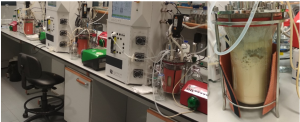The biological pathway for the fuels of the future
Interview with Jose M Sanz Martin, CARTIF
A central step to fully comply with the successful operation of the BioSFerA model is to ensure the highest yield of the fermentation steps by optimizing the different parameters that influence the biomass growth and its productivity.
In the project, CARTIF is one of the partners with an important role in the biological process for the lipids production at lab-scale. Thanks to its experience as Applied Research Centre Foundation in terms of R&D and technology transfer activities, CARTIF is leading the biological step referred to the project’s WP3 activity. Here, few questions to Jose M Sanz Martin, Researcher at CARTIF in the Agrifood and Sustainable Processes Division, to better understand the BioSFerA biological process development at lab-scale and the double-stages fermentation process that leads to the acetate before and after to the TAGs lipids production:
What are the last updates on the optimisation of the acetate fermentation process parameters for C14 and C16-18 TAGs production?
We are currently working on finding the best bioreactor strategy to favour lipid accumulation and for this we are testing nitrogen-limited conditions, continuous feeding of acetate as a main carbon source and recycling of cells using hollow fibre membranes. We are also using an engineered Yarrowia lipolytica strain developed by CSIC, which has improved triacylglycerides (TAGs) productivity. The results are promising and all this leads us to increase lipid production with respect to the wild-type strain.
Did you find any barriers and if yes, how are you trying to dealing with them?
Regarding the gas fermentation, one of the key aspects to improve the process is the choice of a suitable working strain, as well as the establishment of process conditions that allow for higher productivity. In addition, in order for the gases to be used efficiently by the microorganisms, it is very important that they are solubilised properly in the culture medium. To solve these problems, we have selected a strain of the acetogenic bacterium Moorella thermoacetica that is capable of producing a large amount of acetate from syngas, and we have improved the growth conditions by using bioreactors that allow us to control the flow rate of the gas fed as well as to increase the working pressure to favour its solubility in the medium.
As for acetate fermentation with Y. lipolytica, although acetate is a promising cost-effective and suitable carbon source for microbial fermentation, its use as the sole carbon source to enhance lipid synthesis is not very favourable from a metabolic point of view. To overcome this problem, we have confirmed that feeding a co-substrate such as glycerol can help to improve biomass production and drive metabolic flux towards TAGs production.

1.5 L continuous fermentations for TAGs production (installation of cell recycling system and continuous feeding strategy). Detail of the growth of Y. lipolytica from acetate+glycerol.
What are the last promising results?
In relation to acetate fermentation with Y. lipolytica, although we have not yet achieved the expected objectives of lipid production, we observed that the addition of glycerol during the fermentation process together with a nitrogen starvation strategy and limited stress conditions greatly favours the accumulation of TAGs by facilitating their metabolic biosynthesis. From here, we are conducting tests to find the most suitable concentration of glycerol to maximise this lipid accumulation.
For the overall biological production process of lipids from syngas at lab scale, several partners are involved in its optimisation and in different way. As leader of this activity, how this collaboration can impact the research and results?
I believe that the collaboration between all the partners involved in this work package is very beneficial for the progress of the project, as we can share the large amount of work that needs to be done according to the experience and capabilities of each partner. For example, VTT’s expertise in gasification has allowed us to select the best process conditions to achieve a syngas suitable for fermentation with microorganisms. CSIC has obtained genetically modified strains of Moorella and Yarrowia that will maximise the productivity of the process, which is essential for the next stage of scaling up. In terms of bioprocess optimisation, BBEPP has focused more on optimising the anaerobic fermentation conditions, while CARTIF has focused on aerobic fermentation. Finally, ENVIPARK has contributed its expertise in the further processing of the lipids obtained in the fermentation broth.
In addition, the sharing of all the work done and the close collaboration that we have maintained throughout the project has allowed us to clarify many doubts and resolve the technical difficulties that we have encountered. It is certainly very gratifying to be able to work on this topic with some of the best researchers in Europe.



